| Listing 1 - 10 of 16 | << page >> |
Sort by
|
Book
Year: 2000 Publisher: Cambridge, Mass. National Bureau of Economic Research
Abstract | Keywords | Export | Availability | Bookmark
 Loading...
Loading...Choose an application
- Reference Manager
- EndNote
- RefWorks (Direct export to RefWorks)
In many time series models, an infinite number of moments can be used for estimation in a large sample. I supply a technically undemanding proof of a condition for optimal instrumental variables use of such moments in a parametric model. I also illustrate application of the condition in estimation of a linear model with a conditionally heteroskedastic disturbance.
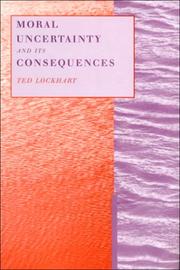
ISBN: 1280471794 0195352165 0585369402 9780585369402 9781280471797 9780195352160 9786610471799 6610471797 9780195126105 0195126106 0195126106 0197730973 Year: 2000 Publisher: New York : Oxford University Press,
Abstract | Keywords | Export | Availability | Bookmark
 Loading...
Loading...Choose an application
- Reference Manager
- EndNote
- RefWorks (Direct export to RefWorks)
Lockhart contends that moral philosophy has failed to address how we make moral decisions. Adapting decision theory to the task of decision-making under moral uncertainly, he proposes that we should not always act how we feel we ought. Sometimes we should act against what we feel morally right.
Decision making --- Uncertainty. --- Reasoning --- Decision-making (Ethics) --- Ethics --- Moral and ethical aspects. --- Uncertainty --- Moral and ethical aspects
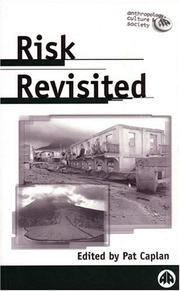
ISBN: 1849640475 0585426279 9781849640473 9780585426273 0745314686 9780745314686 9780745314631 0745314635 Year: 2000 Publisher: London Sterling, Va. Pluto Press
Abstract | Keywords | Export | Availability | Bookmark
 Loading...
Loading...Choose an application
- Reference Manager
- EndNote
- RefWorks (Direct export to RefWorks)
A range of distinguished anthropologists and sociologists re-examine the concept of risk in contemporary societies.
Risk --- Risk perception. --- Risk perception --- Awareness, Risk --- Risk awareness --- Perception --- Sociology of risk --- Sociology of uncertainty --- Uncertainty --- Sociology --- Sociological aspects. --- Sociological aspects --- Risque --- Aspect sociologique
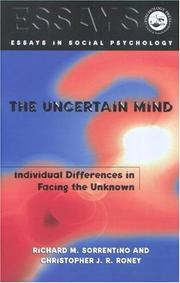
ISBN: 0863776914 Year: 2000 Publisher: Philadelphia : Psychology Press,
Abstract | Keywords | Export | Availability | Bookmark
 Loading...
Loading...Choose an application
- Reference Manager
- EndNote
- RefWorks (Direct export to RefWorks)
Uncertainty is a major force in our lives. Whether it be regarding social relationships, our jobs, or our sense of who we are, these are uncertain times. This new book deals directly with how people cope with uncertainty. The authors show that while some people are relatively comfortable dealing with uncertainty and strive to resolve it (uncertainty-oriented), others are more likely to avoid uncertainty, preferring the familiar or the known (certainty-oriented). They go on to examine the implications of these orientations for understanding processes of self-knowledge, social cognition and attitude change, achievement, motivation and performance, interpersonal and group processes, and issues relating to physical and psychological health concerns. Research is discussed linking this uncertainty orientation to each of these issues, raising important practical and theoretical questions for each. 'The Uncertain Mind' presents some fifteen years of research devoted to understanding the dynamics ofuncertainty orientation. It will be important reading not only for those directly involved in the fields of social motivation and social cognition, but also for a broad range of people across the field of psychology.
Certainty. --- Individual differences. --- Uncertainty. --- Experimentele psychologie --- denken, begripsvorming en problem solving. --- Caractéristiques individuelles --- Certitude --- Incertitude
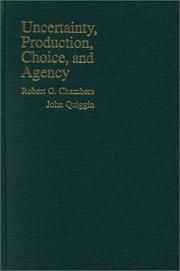
ISBN: 0521622441 0521785235 9780521622448 9780521785235 Year: 2000 Publisher: Cambridge : Cambridge University Press,
Abstract | Keywords | Export | Availability | Bookmark
 Loading...
Loading...Choose an application
- Reference Manager
- EndNote
- RefWorks (Direct export to RefWorks)
Uncertainty --- Production (Economic theory) --- Consumer behavior --- Microeconomics --- Incertitude (économie politique) --- Production --- Consommateurs --- Microéconomie --- Comportement --- Attitudes. --- Attitude (psychologie) --- Production. --- Microéconomie. --- Attitude.
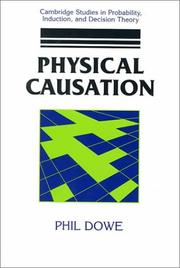
ISBN: 0521780497 0521039754 0511570651 9780521039758 9780521780490 9780511570650 Year: 2000 Publisher: Cambridge Cambridge University Press
Abstract | Keywords | Export | Availability | Bookmark
 Loading...
Loading...Choose an application
- Reference Manager
- EndNote
- RefWorks (Direct export to RefWorks)
This book, published in 2000, is a clear account of causation based firmly in contemporary science. Dowe discusses in a systematic way, a positive account of causation: the conserved quantities account of causal processes which he has been developing over the last ten years. The book describes causal processes and interactions in terms of conserved quantities: a causal process is the worldline of an object which possesses a conserved quantity, and a causal interaction involves the exchange of conserved quantities. Further, things that are properly called cause and effect are appropriately connected by a set of causal processes and interactions. The distinction between cause and effect is explained in terms of a version of the fork theory: the direction of a certain kind of ordered pattern of events in the world. This particular version has the virtue that it allows for the possibility of backwards causation, and therefore time travel.
Causality (Physics) --- Causality --- Heisenberg uncertainty principle --- Nuclear physics --- Physics --- Quantum theory --- Philosophy --- Causality (Physics). --- Arts and Humanities --- Philosophy of science
Book
Year: 2000 Publisher: Leuven : KUL. Department of applied economic sciences,
Abstract | Keywords | Export | Availability | Bookmark
 Loading...
Loading...Choose an application
- Reference Manager
- EndNote
- RefWorks (Direct export to RefWorks)
Component commonality. --- Range split. --- Product family design. --- Mathematical programming. --- Assortment problem. --- Joint production-marketing decision making. --- Uncertainty.
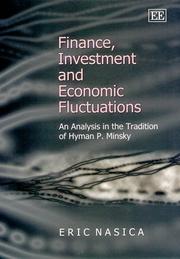
ISBN: 1858988969 Year: 2000 Publisher: Cheltenham Edward Elgar
Abstract | Keywords | Export | Availability | Bookmark
 Loading...
Loading...Choose an application
- Reference Manager
- EndNote
- RefWorks (Direct export to RefWorks)
Business cycles --- Endogenous growth (Economics) --- Financial crises --- Uncertainty --- Mathematical models --- Mathematical models --- Mathematical models --- Mathematical models --- Minsky, Hyman P.
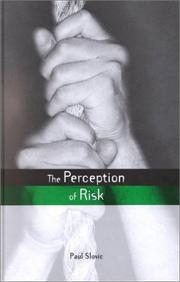
ISBN: 1853835285 1853835277 Year: 2000 Publisher: London ; Sterling, VA : Earthscan Publications,
Abstract | Keywords | Export | Availability | Bookmark
 Loading...
Loading...Choose an application
- Reference Manager
- EndNote
- RefWorks (Direct export to RefWorks)
Social policy --- Affective and dynamic functions --- Philosophical anthropology --- Political philosophy. Social philosophy --- Risk assessment. --- Risk perception. --- Risk --- Sociological aspects. --- Risk assessment --- Risk perception --- #PBIB:2001.2 --- Sociology of risk --- Sociology of uncertainty --- Uncertainty --- Awareness, Risk --- Risk awareness --- Analysis, Risk --- Assessment, Risk --- Risk analysis --- Risk evaluation --- Sociological aspects --- Sociology --- Perception --- Evaluation --- arbeid, veiligheid --- preventie --- radioactiviteit --- risk management --- #SBIB:35H410 --- Beleidscyclus: algemene werken --- Sociology. --- RISKS --- Risk management. --- Insurance --- Management --- Social theory --- Social sciences --- Monograph
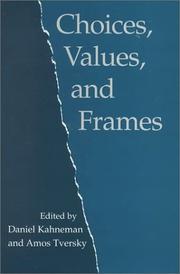
ISBN: 0521627494 0521621720 9780521621724 9780521627498 Year: 2000 Publisher: New York : Cambridge, UK : Russell sage Foundation ; Cambridge University Press,
Abstract | Keywords | Export | Availability | Bookmark
 Loading...
Loading...Choose an application
- Reference Manager
- EndNote
- RefWorks (Direct export to RefWorks)
This book presents the definitive exposition of 'prospect theory', a compelling alternative to the classical utility theory of choice. Building on the 1982 volume, Judgement Under Uncertainty, this book brings together seminal papers on prospect theory from economists, decision theorists, and psychologists, including the work of the late Amos Tversky, whose contributions are collected here for the first time. While remaining within a rational choice framework, prospect theory delivers more accurate, empirically verified predictions in key test cases, as well as helping to explain many complex, real-world puzzles. In this volume, it is brought to bear on phenomena as diverse as the principles of legal compensation, the equity premium puzzle in financial markets, and the number of hours that New York cab drivers choose to drive on rainy days. Theoretically elegant and empirically robust, this volume shows how prospect theory has matured into a new science of decision making.
Decision Making --- Uncertainty --- Risk-taking (Psychology) --- Value --- Decision making. --- Risk-taking (Psychology). --- Uncertainty. --- Value. --- Decision-making --- #PBIB:2001.2 --- 330.104 --- 519.2 --- Standard of value --- Cost --- Economics --- Exchange --- Wealth --- Prices --- Supply and demand --- Reasoning --- Risk behavior --- Risky behavior --- Taking risks --- Human behavior --- Deciding --- Decision (Psychology) --- Decision analysis --- Decision processes --- Making decisions --- Management --- Management decisions --- Choice (Psychology) --- Problem solving --- Micro-economie --- Wiskundige statistiek --- Decision making --- besluitvorming --- emoties --- gedrag --- mathematische modellen, toegepast op economie --- nutstheorieën --- psychologie, sociaal --- risk management --- 159.9 --- Psychologie --- Prise de décision --- Incertitude --- Risque, Prise de (Psychologie) --- Valeur
| Listing 1 - 10 of 16 | << page >> |
Sort by
|

 Search
Search Feedback
Feedback About UniCat
About UniCat  Help
Help News
News